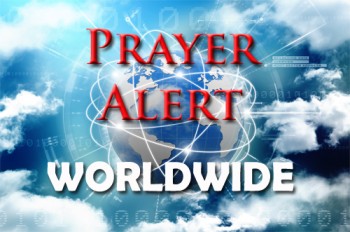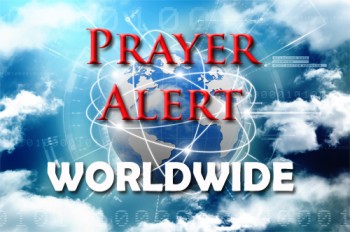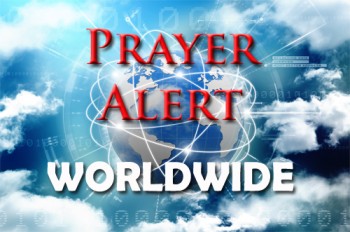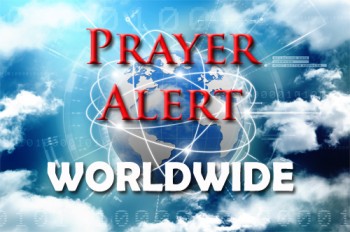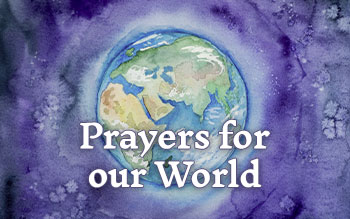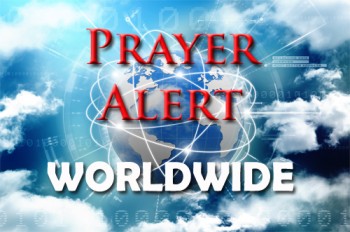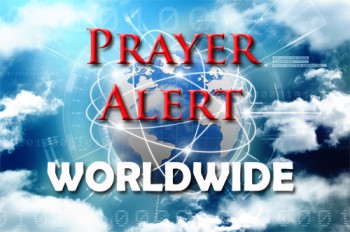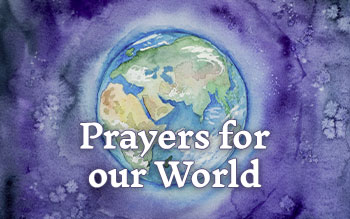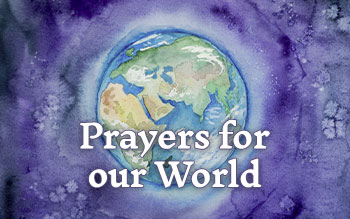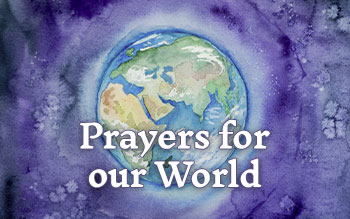Displaying items by tag: Middle East
Israel: pray for snap elections
Following April’s elections Benjamin Netanyahu failed to form a governing coalition, the first such failure in Israeli history. Snap elections will now be held on 17 September. The polls predict another election result that would make it impossible to form a government. Pray for a breakthrough, asking God to bring about His government for Israel. Claim the words of Isaiah 1:26 for these elections. Let the voters have Your mind, particularly as they weigh up Netanyahu’s plan to annexe 600 square miles of Palestinian territory. May the results bring a government through which You can be glorified, and may every stumbling stone to prevent a godly government be removed. The autumn feasts of Rosh Hashanah, Yom Kippur and Succoth begin soon. Pray for Jews to be reconnected to their biblical roots and see the King of Israel, their Messiah and Lord.
Israel / Lebanon: ‘30 minutes from war’
On 1 September Hezbollah fired several precision-guided missiles from Lebanon towards an army base on Israel’s northern border, destroying an IDF armoured vehicle in the attack. Thankfully, there were no soldiers inside it at the time, but there had been just 30 minutes before the attack, leading Israel’s Army Radio to broadcast that Israel and Hezbollah were ‘30 minutes away from war’. Israel led Hezbollah to believe that there were casualties by staging a well-planned medical evacuation, prompting the terror group to hold fire and giving Israel tactical advantage to strike back with artillery and helicopter fire, sending over 100 shells into Hezbollah positions in Lebanon. Many lives are at risk due to escalating tensions between Israel and Iran’s proxy, Hezbollah.
Lebanon: escalation of tensions
Lebanon opened fire on Israeli surveillance drones on 28 August, heightening the conflict between the warring neighbours. Lebanon does not usually attempt to down Israel’s unmanned surveillance planes, but its Hizbollah military wing said it was preparing a ‘calculated strike’ against Israel, in retaliation for an Israeli raid on its position near Damascus and a drone attack in Beirut on its Iranian missile-making equipment. Sources believe Lebanon will target Israeli soldiers on patrol near the border. Israeli media reported that Israel had targeted and destroyed machinery used for the production of precision-guided missiles. It is trying to disrupt the flow of weapons and technology from Iran to its proxies in Syria and Lebanon. In response to constant rocket attacks, Israel has carried out hundreds of strikes against Hizbollah and Iranian positions in Syria, so far with little response. Lebanon’s president is increasingly influenced by Hizbollah, which is also represented in the country’s parliament.
Israel: project unites settlers and Druze
Emil Masud is an Arab Druze farmer who identifies as ‘for ever Syrian’, and Ofer Megged is a physics professor settler in the contested Golan Heights. The unlikely partners are working together to save the environment against Enrgix, an energy company which wants to erect dozens of turbines, some 64 storeys high, on cherry and apple orchards owned by the Druze. They promised jobs and financial incentives and about 40 Druze landowners agreed. Then news emerged of infrasound waves from the turbines that cause headaches, nausea and dizzy spells. The fertility of farmers’ bountiful agricultural lands was also at risk. ‘Our lands will be destroyed,’ Masud said. ‘We cannot allow this disaster to happen. Druze, Jews, there is no difference. We have joined hands against a common enemy to stop it.’ Many farmers who signed contracts with Enrgix have reneged, so Enrgix is preparing to file lawsuits.
Lebanon - Prayers for the Church
Lebanon's name was mentioned 71 times in the Old Testament. Its regions are referred to several times in the New Testament. The Old Testament is full of praise for Lebanon's natural beauty and resources and God's love for men and women is celebrated.
Lebanon's role in the history of salvation becomes even more evident in the writings of New Testament authors. Jesus Christ, the Son of God, visited the Phoenician cities along Lebanon's coast, preached to the people there and healed the sick.
God loves His people and He wants them to be saved. We had a burden for many years to pray continually for Lebanon, we want to see Lebanon transformed to Jesus Christ. Hallelujah.
In Psalm 24:1-2 we read “The earth is the Lord’s, and everything in it, the world, and all who live in it; for he founded it on the seas, and established it on the waters.”
CHURCH:
Pray: for unity between all church denominations in Lebanon (Catholic, Orthodox, Evangelica, etc...) Let every church become a house of prayer leading people to know about Jesus as the only true saviour. Pray for all church leaders, bishops, archbishops, all clergy and lay ministers.
Pray: for the church in Lebanon that Jesus established to be strong. Jesus’ church has stood the test of time. It cannot be stopped by force, political pressure, or even political correctness. Jesus will continue to build His church until He returns in glory to redeem His bride, and absolutely nothing or no one can stand in His way.
Pray: that the Lord God gives His church the spirit of wisdom and revelation in knowledge according to the riches of His glory, for His faithful to be strengthened with might by His Spirit that Christ may dwell in the hearts of His Lebanese people for ever; and that they are rooted and grounded in love. May they be able to comprehend and to know the love of Christ, which passes all knowledge, that they might be filled with all the fullness of God.
Lilian Schmid - Coordinator
Prayer Strategy for the Spheres of Influence
www.prayerstrategy.org
Syria: car bombing, stoning, rape and torture
In July at least eight people were injured outside a church by an IS car bomb, in an area held by the Kurdish YPG militia. On the same day in Afrin, on the border with Turkey, a bomb killed eleven civilians, including children, and injured others, some seriously. Homes were damaged in the explosion and subsequent fire. A few days earlier a retired Christian school teacher went missing from her home in a mainly-Christian village near Idlib. The next day her body was found nearby: she had been raped repeatedly, tortured, and stoned to death by Islamist militants linked to an rebel group in the area. Forensic investigation found that the barbaric ordeal had lasted for around nine hours before she finally died.
UN condemns 'international indifference' to Syria
The UN human rights chief Michelle Bachelet says that those responsible for airstrikes targeting Syrian civilians could be charged with war crimes, calling it ‘a failure of leadership by the world's most powerful nations’. Since late April 400,000 have been displaced and over 730 civilians killed by Syrian and Russian attacks on militant-held Idlib where three million still live. The airstrikes on schools, hospitals, markets and bakeries killed over 103 civilians in just ten days, including 26 schoolchildren killed in their classroom seats. Ms Bachelet added, ‘These are civilian objects, and it seems highly unlikely, given the persistent pattern of such attacks, that they are all being hit by accident. There is an international indifference to the rising civilian death toll caused by a succession of airstrikes.` Both the Syrians and Russians deny targeting civilians or civilian infrastructure.
Muslims in Turkey showing interest in Jesus amid Erdogan's authoritarian crackdown, Andrew Brunson says
WASHINGTON — Evangelical missionary Andrew Brunson said Thursday that the authoritarian crackdown and struggling economy in Turkey are causing more Muslim Turks to show interest in the Bible at a time in which the “storm clouds” of Christian persecution seem to be forming.
Brunson, a North Carolina native who spent two decades planting churches in Turkey before spending two years in prison on trumped-up terrorism charges, expressed deep concern about the future of Turkey’s small Protestant population during a hearing hosted by the U.S. Commission on International Religious Freedom on Capitol Hill.
“There is still a high degree of freedom for Christians relative to other Muslim countries in the region, but I am concerned that all the signs point to this changing soon,” said Brunson, who was released from prison last October after months of pressure from the U.S. government.
In the midst of a massive government crackdown in the wake of the 2016 failed coup attempt against the Erdogan government, Brunson explained that the regime has accelerated the expulsion and deportation of foreign Christian leaders.
According to Brunson, as many as 50 foreign Christian families have recently been deported from Turkey.
The 51-year-old read off a list of Protestant Christians in Turkey who have been deported after being accused of being a “threat to national security.” Most of them were leaders within their respective churches, he said.
He added that the Turkish church relies on foreign leadership because the Turkish government does not allow Christians to set up training programs in order to develop leaders in the country.
In the city in which he served for many years, Izmir, Bruson said that nearly half of all churches there have lost their senior leaders.
Citing a 2018 report from the Turkish Association of Protestant Churches, Brunson said there has also been “a significant increase in public hate speech designed to incite public hatred of Protestants.”
He said even more concerning was the “coupling together of churches and terror organizations in news reports without any evidence of substantiation.”
He blamed the Erdogan government for sewing a deep hatred of Christians in the hearts of Muslim Turks by spreading lies about him and Christians. He said government-fed propaganda has created a tense atmosphere for Christians in Turkey.
Even after his release, Brunson said that lies are still being spread about him in Turkey. He was accused of being a spy and even working on behalf of the CIA in an effort to overthrow the Turkish government.
“The foreign minister still refers to me in public as a spy and calls me ‘Agent Brunson,’” he said. “After the State Department report on religious freedom was published recently, the spokesman insisted that ‘Pastor Brunson was convicted because of his affiliation with terrorism not because of his faith.’ This is simply not true. I know that the Turkish government, especially at the highest levels, knew all along that I was innocent.”
He added that there were accusations in Turkish media that he was the one who gave orders for the New Zealand mosque shootings in March that took the lives of 50 people. Brunson said he was disgusted with such an accusation.
“The government is using the after-coup, the conditions to crackdown on a lot of people. So far, it hasn’t included Christians that much,” Brunson said in response to a question from USCIRF Vice Chair Gayle Manchin. “Like I said, there is a high degree of freedom compared to other places in the Middle East. However, the signs are negative and the storm clouds are gathering.”
“I think there are a number of people in the Turkish church, who as they see a lot of the foreign Christians being expelled from the country, [who] are very concerned about what is going to happen to them,” he added.
Brunson said that his indictment provides an example of how the Erdogan government views Christians.
“My crime was ‘Christianization,’” he stressed. “Acting as, I quote, ‘as an agent of unconventional and psychological warfare under the guise of an evangelical church pastor.’ All of our work was intended to fragment Turkey, they said.”
“Basically, the indictment was associating Christianization with terrorism and presented Christianity as a danger to Turkey’s unit,” he continued. “The senior judge said I was not on trial for missionary activity. But much of the supposed evidence against me as proof of supporting terrorism was our ministry activities.”
Brunson added that Erdogan once said while speaking in the context of his case that “To be a Turk is to be a Muslim.”
“This is the way that they see things often,” he said. “Obviously, Christians are not a threat to the Turkish government in any way. We expect Christians to be good citizens, to pay their taxes, to obey the law. They tend to be very generous and loving people. But if someone has that mentality that to be a Turk is to be a Muslim, then if one leaves Islam and becomes a Christian, then they will be seen as traitors. This has been one of the problems.”
Despite the increasing social tensions and deportation of foreign pastors, Brunson said he has heard from leaders inside Turkey that curious Muslims in Turkey are coming to Christian churches in search of spiritual answers at a greater rate than before.
Brunson said that there are about 6,000 Protestant converts from Islam in the nation of 83 million people.
“But we do see many more people,” he said. “This is interesting to me as someone who was starting churches in Turkey. Because of the crackdown and the difficult conditions in Turkey right now, more and more people are showing an interest in the Bible and in visiting a church and asking questions about Christianity.”
Brunson told The Christian Post after the hearing that he believes there is a “great spiritual harvest” coming to Turkey in which many people will turn to Jesus.
“I think that the conditions for people to turn will be difficult conditions,” he said. “We have expected there to be a great move of God but we have expected that it will happen in difficult circumstances. So I think that this government is actually creating a lot of circumstances for many people. Since they are doing this in the name of Islam that many Muslims are saying, ‘Is this is what we want?”
Those “difficult conditions” come in the form of the struggling Turkish economy and the decline in the exchange value of the Turkish lira.
“Many young people, especially, are starting to question. One of the things I taught in Turkey and they used against me in the trial was I said that ‘Turkey will be shaken,’” Brunson explained to CP. “I also think the same thing could happen in the States. God will shake the foundations of the things that we trust in order to get our attention.”
I think that is what is happening now. There are a lot of people who before wouldn’t have spiritual questions,” he continued. “But because of the difficulties they are experiencing and the things they have taken for granted or trusted and given security have been kind of removed, now they are beginning to think about things they wouldn’t have before.”
Many of those who are coming to churches to “seek,” he said, are wanting either a copy of the New Testament or just want to meet a Christian and learn about Jesus.
“We see people dropping in at churches,” he said. “There are many more people coming and asking for information than in the past.”
Reporting by Samuel Smith for The Christian Post
PRAY that God would continue to use Andrew Brunson to share the needs for the prayers and partnerships for Turkey and what God is doing in the Middle East
PRAY that the current Turkey government would not suppress the freedom for all religions as stated in its constitution, especially that of Christians and the churches
PRAY that the nation-wide spiritual awakening would come in Turkey and among its people that they would open their hearts Jesus Christ and His gospel
Christians persecuted in 3 of 4 nations globally
'Have been harassed in more countries than any other religious group'
There are some 197 countries around the world.
And in 144 of them, Christians are persecuted, according to a report commissioned by the British government.
There is widespread evidence showing that “today, Christians constitute by far the most widely persecuted religion,” the report said.
It found that “Christians have been harassed in more countries than any other religious group and have suffered harassment in many of the heavily Muslim countries of the Middle East and North Africa.”
There are some 245 million Christians living in the top 50 countries for persecution and they suffer “high levels” or worse. Previously, only one country, North Korea, was classified as having “extreme” persecution. Now there are 11 countries.
Turkish journalist Uzay Bulut, a senior fellow at the Gatestone Institute, noted “persecution against Christians and other non-Muslims is not about the ethnicity, race or skin color of either the perpetrators or the victims; it is about their religion.”
In Africa, he said, “various Islamist groups and individuals are attacking and attempting to annihilate Christians for being Christian. If these crimes are not stopped, it is highly likely that the fate of the African Continent will be like that of the Middle East: Once it was a majority-Christian region; now, Christians are a tiny, dying, defenseless minority.”
The British report is the “Bishop of Truro’s Independent Review for the Foreign Secretary of FCO Support for Persecuted Christians.”
The FCO is the nation’s Foreign and Commonwealth Office.
The bishop, the Rt. Rev. Philip Mounstephen, explained: “The Independent Review was announced at Christmas and this Interim Report is published in the Easter season. Both of these great festivals remind us that weakness and vulnerability are at the heart of the Christian faith. Jesus Christ was born into poverty and laid in a feeding-trough. He died as a victim of persecution himself. Given that, it is hardly surprising that many of his followers today count among the weakest and most vulnerable people on the planet. It is to them, to their needs and to their support, that this Interim Report is dedicated.”
He wrote that in addition to Christians being the most targeted, “the evidence suggests that acts of violence and other intimidation against Christians are becoming more widespread.”
The report said that “in some regions, the level and nature of persecution is arguable coming close to meeting the international definition of genocide.”
It said the “eradication of Christians and other minorities on pain of ‘the sword’ or other violent means was revealed to be the specific and stated objective of extremist groups in Syria, Iraq, Egypt, northeast Nigeria and the Philippines.”
“An intent to erase all evidence of the Christian presence was made plain by the removal of crosses, the destruction of church buildings and church symbols,” the report said.
“The killing and abduction of clergy represented a direct attack on the church’s structure and leadership. Where these and other incidents meet the tests of genocide, governments will be required to bring perpetrators to justice, aid victims and take preventative measures for the future.”
Christianity, in fact, “now faces the possibility of being wiped out in parts of the Middle East where its roots go back further. In Palestine, Christian numbers are below 1.5 percent, in Syria the Christian population has declined from 1.7 million in 2011 to below 450,000 and in Iraq, Christian numbers have slumped from 1.5 million before 2003 to below 120,000 today.”
In some parts of the world, “extrajudicial killings and the enforced and involuntary disappearance of Christians are also widespread,” the report said.
Bulut cited the destruction of a Christian school by Muslims in Uganda, a church in Niger burned by Muslims and terror attacks in Burkina Faso that left 29 Christians dead.
In one incident, the assailants “asked the Christians to convert to Islam but the pastor and the others refused.”
“They ordered them to gather under a tree and took their Bibles and mobile phones. Then they called them, one after the other, behind the church building where they shot them dead.”
He said that terrorist groups are not the only sources of persecution in Africa as many Muslim governments and individuals also target Christians.
We must pray for our Indian brethren, asking God to preserve the faith in a subcontinent where it is every bit as native as that which seeks to drive it out.
Article by WND
More at:https://www.wnd.com/2019/07/report-christians-persecuted-in-3-of-4-nations-globally/
IRAN: Believers targeted amid US-Iran tensions
Iran (MNN) — Tensions rise between the United States and Iran amid sanctions, threats, and fights over missiles, nuclear deals, oil stores, and shipping routes.
Last week, Iran tested ballistic missiles as the U.S. worked with allies to safeguard ships in the Strait of Hormuz. According to Middle East Monitor, Russia predicts “full-scale armed conflict” in the region.
Unfortunately, these sky-high political tensions have led to a crackdown within Iran, explains Heart 4 Iran’s Mike Ansari. “In the last few weeks, [the] Iranian government has announced the arrest of multiple Iranian citizens who were allegedly CIA spies,” he says.
“In light of the recent sanctions, Iranian authorities are increasing the pressure on Western governments to loosen up the restrictions imposed on Iran.”
Authorities often target believers for accusation and arrest.
Life for believers inside Iran
Earlier this year, Open Doors USA placed Iran at #9 on its World Watch List – a ranking of 50 nations where following Christ is most difficult. By law, Christians cannot share their faith with non-Christians. Believers from a Muslim background face the most oppression because Islamic law governs Iran; society views converts as apostates.
“In Iran, conversion from Islam to Christianity – known as apostasy – is strictly forbidden. In fact, Iranian religious rulers have publicly advocated for the death penalty as a punishment for apostasy,” Ansari explains.
“When a Muslim converts to Christianity, they are warned, persecuted, [sometimes] arrested, and their belongings are confiscated.”
For converts who leave Iran, return could mean imprisonment and severe persecution. “Case in point – Mrs. Fatemeh Azad, a 58-year-old Iranian convert to Christianity who fled Iran, sought refuge in Germany, but was denied asylum and deported back to Iran,” Ansari describes.
“Upon her return, she was arrested and released on bail.”
As reported here by International Christian Concern:
When Fatemeh made her asylum appeal, her lawyers argued that apostasy (conversion away from Islam) is punishable by the death penalty in Iran. This penalty has not been issued in Iran for several years, in large part thanks to international pressure. However, Iran regularly imprisons converts for years. Christians are commonly charged with “acting against national security” and can face a prison sentence of up to 15 years with this charge.
“The Iranian Christian community in diaspora is concerned with the safety and well-being of Mrs. Azad while she resides in Iran,” Ansari says.
How to help
Mrs. Azad’s case represents a larger challenge, he adds. That’s an urgent matter for which you can pray.
“The real concern for Mrs. Azad is that Iranian authorities may use her as a pawn to not only instil fear in the heart of their own people but challenge the international community on human rights and religious freedom in Iran.”
Ask the Lord to comfort and encourage Fatemeh Azad during her imprisonment. Pray for her safety, Ansari requests, and “pray for the multitude of Iranian refugees who have legitimately fled Iran and can’t go back.”
Heart4Iran partners with over 100 groups to bring the love and hope of Jesus Christ to the people of Iran.
Reporting by Katey Hearth for Mission Network News
More at: https://www.mnnonline.org/news/believers-targeted-amid-us-iran-tensions/
Pray: For the safety and freedom of Mrs. Fatemeh Azad and many others in a similar situation to practice their faith.
Pray: That she will not be used as a pawn within Iran or internationally.
Pray: For those working to represent Mrs Azad and other Christians who face persecution in their home countries.
